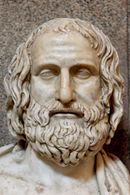Born on the picturesque Salamis island, a Greek gem located off the coast of Athens, around 484 BC, the renowned playwright Euripides is widely regarded as the first professional writer to emerge from the city's rich cultural scene.
Euripides' dramatic works are characterized by their exploration of the intense and often turbulent human passions that drive individuals to act, with his focus centered on the powerful emotions of love, hate, and revenge. Interestingly, his plays often feature gods who, despite their divine status, exhibit questionable moral compasses, mirroring the flaws and weaknesses of the human characters.
In many of his productions, women assume leading roles, with the iconic "Medea" arguably being his most celebrated work. Euripides was also a pioneer in emphasizing the significance of dialogue, thereby diminishing the prominence of the traditional chorus, a staple of ancient Greek theater.
Throughout his illustrious career, Euripides penned approximately 90 plays, although sadly, only around 18 of these have survived to the present day, with the remainder being lost or existing only in fragmented forms.




















